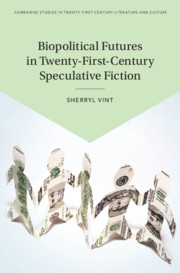Book contents
- Biopolitical Futures in Twenty-First-Century Speculative Fiction
- Cambridge Studies in Twenty-First-Century Literature and Culture
- Biopolitical Futures in Twenty-First-Century Speculative Fiction
- Copyright page
- Contents
- Acknowledgments
- Introduction
- Chapter 1 Suspending Death, Reinventing Life
- Chapter 2 The New Flesh
- Chapter 3 Capital Reproduction
- Chapter 4 Surplus Value
- Chapter 5 Life Industries
- Chapter 6 Living to Work
- Chapter 7 Life Optimized
- Chapter 8 Surplus Vitality and Posthuman Possibilities
- Conclusion
- Notes
- Bibliography
- Index
Chapter 3 - Capital Reproduction
Maternity and Productivity
Published online by Cambridge University Press: 16 September 2021
- Biopolitical Futures in Twenty-First-Century Speculative Fiction
- Cambridge Studies in Twenty-First-Century Literature and Culture
- Biopolitical Futures in Twenty-First-Century Speculative Fiction
- Copyright page
- Contents
- Acknowledgments
- Introduction
- Chapter 1 Suspending Death, Reinventing Life
- Chapter 2 The New Flesh
- Chapter 3 Capital Reproduction
- Chapter 4 Surplus Value
- Chapter 5 Life Industries
- Chapter 6 Living to Work
- Chapter 7 Life Optimized
- Chapter 8 Surplus Vitality and Posthuman Possibilities
- Conclusion
- Notes
- Bibliography
- Index
Summary
This chapter interrogates practices of biotechnology related to pregnancy and reproduction. Taking note of a recent proliferation of speculative texts about compromised fertility and draconian measures to control women’s reproductive freedoms, alongside continued legislative attempts to restrict access to abortion and other tools of family planning, this chapter asks what it means that we have become so obsessed with the life of the unborn fetus. Through an analysis of practices in the fertility industry, and especially the transnational market in surrogacy services, this chapter reads two speculative fiction works about changed fertility: Jane Rogers’ The Testament of Jessie Lamb and Louise Erdrich’s Future Home of the Living God. It argues that increasingly restrictions that prevent those in the Global North from accessing surrogacy and related fertility services from those in the Global South speak to a perceived crisis in reproductive futurity. The plethora of narratives about a crisis in fertility, then, speak to a racialized anxiety about the scarce “supply” of reproductive capacity: whose fertility and family structures will be preserved into the future?
- Type
- Chapter
- Information
- Publisher: Cambridge University PressPrint publication year: 2021

